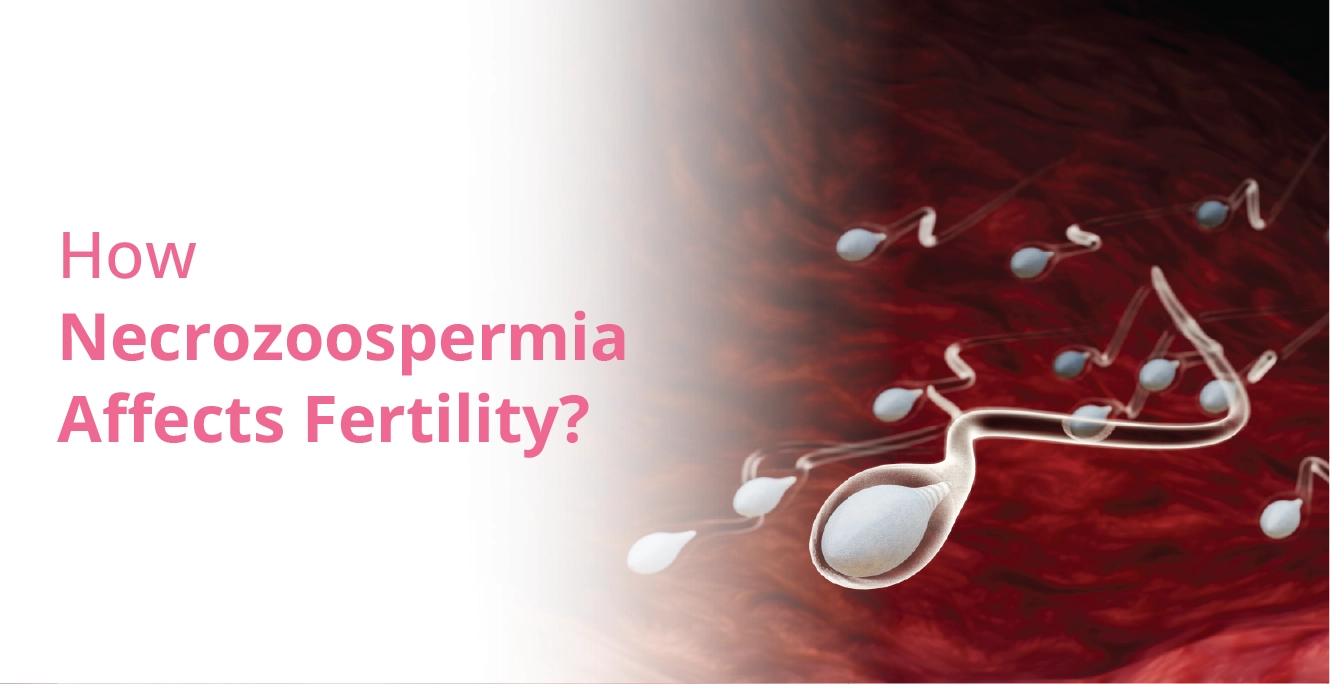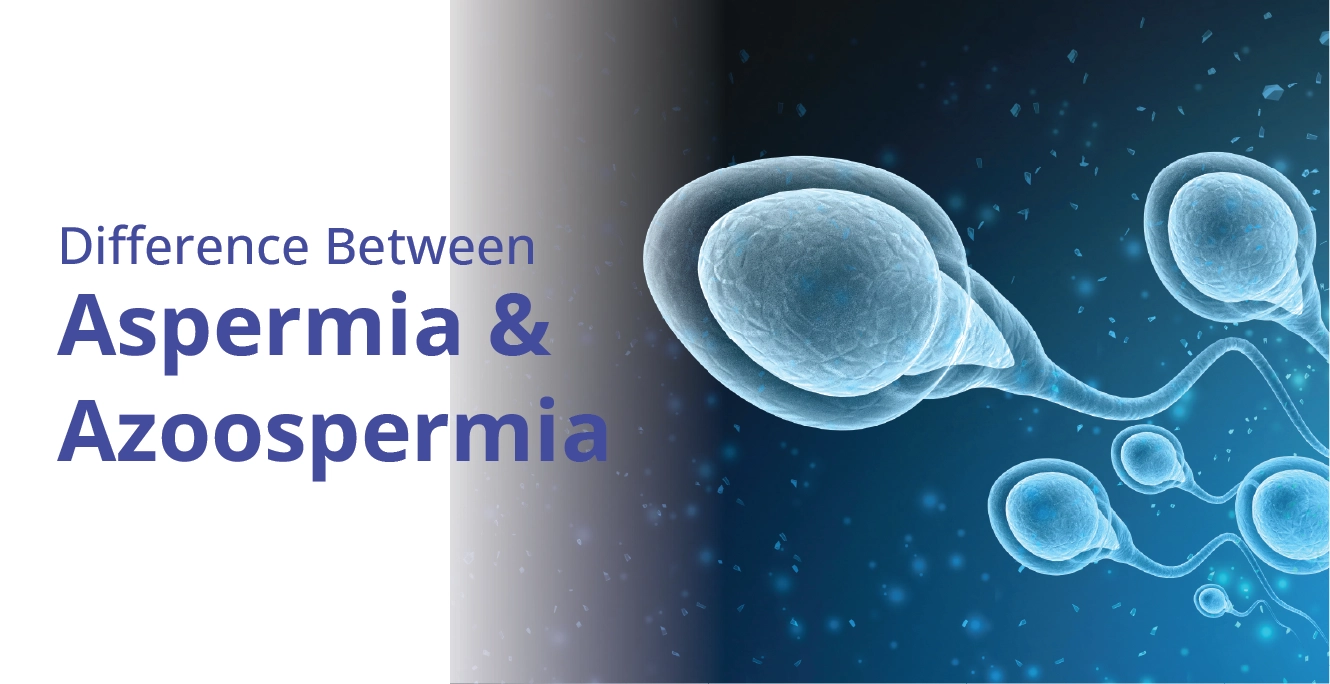
Aspermia: Causes, Symptoms & Treatment

Table of Contents
- What is Aspermia?
- Types of Aspermia
- Risk Factors For Aspermia
- Causes of Aspermia
- Symptoms of Aspermia
- Does Aspermia Affect Fertility?
- Ways to Diagnose Aspermia
- Treatments For Aspermia
- Treatment for Retrograde Ejaculation
- Aspermia Complications
- Prevention of Aspermia
- Are Azoospermia and Aspermia the Same?
- Wrapping it Up!
- FAQ’s
Even though nearly 50% of all infertility cases are linked to male factors, they are often ignored.
Men usually hesitate to share their concerns related to their reproductive health, and one such concern is Aspermia. The name may sound alarming to many, but this condition is manageable and treatable with the right diagnosis and timely intervention. In this blog, we will walk through this topic in detail, and also learn about the other conditions, like azoospermia, which are usually confused with aspermia.
What is Aspermia?
It’s a medical condition that affects men mostly in their reproductive ages, where they are not able to ejaculate semen during orgasm. This also refers to the absence of semen. Many people confuse it with azoospermia, a condition where the semen is produced, but there is no sperm in it.
Aspermia does not pose a threat to life, but it has a significant impact on male fertility and their emotional health. The inability to ejaculate semen means that sperm cannot reach the egg, which makes it difficult to conceive without medical intervention.
Types of Aspermia
Aspermia can be categorised into two main types basis their underlying cause:
| Type of Aspermia | Description |
| Psychogenic |
|
| Organic |
|
Risk Factors For Aspermia
Though Aspermia can impact men of any age group, it is mostly diagnosed in adults of reproductive age.
The following individuals are at high risk:
- Those who have had spinal cord injuries or pelvic surgeries.
- Those taking medicines that affect ejaculation.
- Those who have neurological disorders such as multiple sclerosis or diabetes-related nerve damage.
- Those who have undergone radiation therapy or chemotherapy.
- Those suffering from chronic infections or inflammation in the reproductive tract.
Causes of Aspermia
The causes of Aspermia can involve both physiological and psychological factors. Finding the right reason is crucial for the right treatment planning.
Ejaculatory Duct Obstruction
It is caused when a blockage in the ducts that carry semen prevents ejaculation. This may occur due to infections, cysts, or surgical damage.
Retrograde Ejaculation
When semen flows backwards into the bladder rather than exiting the penis, it is called retrograde ejaculation. Common causes include:
- Diabetes-related nerve damage
- Certain medications (used for high blood pressure or depression)
- Prostate or bladder surgery
Neurological Disorders
Conditions that interfere with the nerve signals required for ejaculation can also cause apermia. These can be:
- Spinal cord injuries
- Multiple sclerosis, or
- Parkinson’s disease
Hormonal Imbalances
Testosterone is one of the key male reproductive hormones. Low levels of reproductive hormones, particularly testosterone, may impact sperm production and ejaculation.
Psychological Factors
Severe anxiety, depression, or performance stress can interfere with sexual function, sometimes leading to Aspermia.
Medication Side Effects
Certain medications, such as antidepressants, antipsychotics, or alpha-blockers, can affect the nerves and muscles responsible for ejaculation.
Surgical or Radiation Damage
Surgeries involving the prostate, bladder, or spinal cord, as well as radiation therapy in the pelvic area, can damage the reproductive pathways.
Congenital Defects
Some men are born with missing or blocked ejaculatory ducts, leading to congenital Aspermia.
Symptoms of Aspermia
The most common symptom of Aspermia is the absence of semen during orgasm. However, the other symptoms that should not be ignored are:
- Dry ejaculation (no visible semen)
- Normal sexual desire but no ejaculation
- Cloudy urine after intercourse (seen in retrograde ejaculation)
- Difficulty in achieving orgasm
- Infertility or inability to impregnate a partner
Note: Retrograde ejaculation is another condition whose symptoms can mimic Aspermia, but both are different. In retrograde ejaculation, semen flows backwards into the bladder instead of exiting through the penis.
Does Aspermia Affect Fertility?
Yes. Aspermia has a direct impact on male fertility. Ejaculation is required for sperm to reach and fertilise the egg. No semen means sperm cannot be transferred naturally, which leads to infertility.
However, Aspermia does not mean pregnancy is impossible. In many cases, sperm production is normal, as it is the ejaculation process that is actually affected. With the help of assisted reproductive techniques such as IVF and ICSI, sperm can be directly retrieved from the testes, andcouples can achieve pregnancy.
Ways to Diagnose Aspermia
Your doctor may use a combination of tests to accurately diagnose the root cause.
Initial Evaluation
- Your doctor may enquire about your medical history and ejaculation patterns, as this helps in better evaluation of the problem.
- They may also ask about any past surgeries or injuries, medications or any underlying health conditions.
- A physical examination may be conducted to check for any abnormalities in the reproductive organs.
Semen Analysis
A semen analysis is the gold standard to check male infertility. It helps determine the presence of sperm and its health. Further tests are advised if any issues are suspected.
Urine Test
If your doctor is suspicious about retrograde ejaculation, a urine test after orgasm may be suggested to check for the presence of sperm.
Hormone Test
Testosterone, LH (Luteinising Hormone), and FSH (Follicle-Stimulating Hormone) are key reproductive hormones. Hormonal analysis includes a blood test to detect any imbalances.
Imaging Tests
Transrectal ultrasound or MRI scans are advanced diagnostic tools that aid in identifying structural abnormalities or blockages in the ejaculatory ducts and seminal vesicles.
Genetic Testing
In rare cases where congenital abnormalities are suspected, genetic testing may be recommended.
Neurological Examination
If a nerve-related cause is suspected, the doctor may perform tests to evaluate nerve function in the pelvic region.
Treatments For Aspermia
The treatment of Aspermia depends on its underlying cause. The following are some popular treatment approaches your doctor may follow:
Medication
If Aspermia is caused by medication side effects or mild nerve dysfunction, your doctor may adjust your current medications. They may also prescribe imipramine or pseudoephedrine – drugs that stimulate ejaculation.
Hormone replacement therapy
This may be suggested to treat hormonal imbalances to help restore normal sexual and reproductive function.
Surgery
Surgical correction may be required to restore ejaculation in case of any blockages or obstructions. Common procedures include:
- Ejaculatory Duct Resection, which removes blockages in the ducts
- Vasovasostomy that reconnects reproductive pathways blocked due to surgery or infection
Treatment for Retrograde Ejaculation
Common methods include:
- Alpha-agonist medications that strengthen the bladder neck muscles
- Bladder washing techniques to retrieve sperm from urine for IVF or ICSI
Counselling
- For psychogenic Aspermia, therapy and counselling play a crucial role
- Addressing anxiety, depression, or relationship issues can help restore normal ejaculation
Assisted Reproductive Techniques (ART)
If ejaculation cannot be restored but sperm production remains normal, ART methods are used to help couples conceive:
- Testicular Sperm Extraction (TESE) or Microsurgical Epididymal Sperm Aspiration (MESA) to retrieve sperm
- IVF or ICSI for fertilisation using the retrieved sperm
Lifestyle Changes
Adopting a healthy lifestyle can support treatment:
- Quit smoking and reduce alcohol intake
- Manage diabetes and other chronic conditions
- Avoid exposure to toxins or radiation
- Maintain a balanced diet rich in antioxidants
Aspermia Complications
While Aspermia itself is not physically harmful, it can lead to a number of complications if left untreated.
Infertility
The most direct consequence is infertility, as ejaculation is essential for natural conception.
Anxiety Issues
Men may experience feelings of inadequacy, depression, or low self-esteem related to sexual performance and fertility.
Underlying Health Conditions
Since Aspermia can be a symptom of diabetes, hormonal disorders, or neurological diseases, it is important to identify and treat the root cause early.
Relationship Strain
Fertility issues often put emotional strain on relationships, highlighting the importance of open communication and professional counselling.
Surgical or Medication Side Effects
Treatment methods like surgery or hormone therapy can have side effects if not carefully monitored by specialists.
Prevention of Aspermia
Though all cases of aspermia cannot be prevented, there are some prevention tips that can help reduce the risk.
- Managing chronic health conditions like diabetes and hypertension is important as they can damage nerves involved in ejaculation.
- Alcohol, smoking, and recreational drugs can have a significant impact on the nerves and sexual health. Avoiding their consumption not only helps maintain good reproductive health but also overall wellness.
- If you are taking any medicines, discuss their side effects with your doctor to rule out or prevent any negative impact on ejaculation.
- Use protection during sexual activity to avoid infections that could lead to scarring or blockage of ducts.
- Do not ignore mental health. Address stress, anxiety, or emotional challenges promptly. Psychological well-being plays a major role in sexual health.
Are Azoospermia and Aspermia the Same?
Most people confuse aspermia withazoospermia, but these are two distinct conditions.
| Aspect | Azoospermia | Aspermia |
| Meaning | Semen is produced but contains no sperm | No semen is ejaculated during orgasm |
| Impact on Fertility | No sperm for fertilisation | No semen to carry sperm |
| Causes | Possible causes involve: – Blockage – Testicular failure- Hormonal issues |
Possible causes involve: – Nerve damage – Retrograde ejaculation – Blockage |
| Treatment Options | Common treatments are:
– Surgical sperm retrieval |
Common treatments are: – Medication – Surgery – Assisted Reproductive Techniques – Psychological therapy |
Wrapping it Up!
We understand that aspermia can be emotionally as well as physically challenging, but the good part is, it is treatable in most cases. The absence of semen does not always mean sperm are absent too. Becoming a father is still possible. All you need is the right diagnosis and timely expert guidance. Do not hesitate to consult our reproductive health specialists at Birla Fertility & IVF. Early intervention not only improves the chances of recovery but also helps preserve your emotional well-being and reproductive potential.
FAQ’s
What is the difference between Oligospermia, Azoospermia, and Aspermia?
- Oligospermia: The semen contains sperm, but the sperm count is lower than normal.
- Azoospermia: The semen is produced, but it contains no sperm at all.
- Aspermia: There is no semen ejaculation during orgasm.
What is the cure for Aspermia?
Most men with Aspermia can be successfully treated and regain fertility with medical support. Medications, surgery, ART, and psychological counselling are some of the treatment options that help treat aspermia depending on its root cause.
Can lifestyle changes treat and prevent Aspermia?
Lifestyle changes alone may not cure Aspermia but can support treatment and help prevent it. Healthy habits improve nerve, hormonal, and reproductive health.
What lifestyle changes can help manage Aspermia?
Eat healthy, exercise regularly, quit smoking, limit alcohol, manage diabetes, reduce stress and get regular check-ups.
Does Aspermia Cause Pain?
Aspermia may not cause pain or physical discomfort, but it can lead to anxiety or low self-esteem, especially when associated with infertility.
Our Fertility Specialists
Related Blogs
To know more
Birla Fertility & IVF aims at transforming the future of fertility globally, through outstanding clinical outcomes, research, innovation and compassionate care.
Had an IVF Failure?
Talk to our fertility experts

 Our Centers
Our Centers















